Despite the increasing educational attainments among women, the gender wage gap persists as a stark reality, unfazed by the rising number of female graduates. A recent study by the Census Bureau sheds light on the intricate relationship between education and earnings, revealing a persistent disparity across various fields of study. The data highlights a concerning trend: even with similar educational backgrounds, men continue to out-earn women, underscoring a complex issue that transcends mere academic achievement.
The study presents a detailed breakdown of median annual earnings by gender across different degree specializations for individuals aged 25 to 64 in 2022. Notably, men significantly out-earned women in high-paying fields like electrical engineering, computer science, and mechanical engineering, with gaps ranging from tens of thousands of dollars. This pattern held across STEM and non-STEM disciplines, with men enjoying an economic advantage irrespective of the field. Surprisingly, this occurs against the backdrop of women surpassing men in obtaining bachelor’s and master’s degrees, highlighting an ironic twist in pursuing educational equity.
“Social scientists for decades have been trying to identify factors contributing to the gender wage gap, which these data show existed even among holders of bachelor’s degrees in the same field of study,” the Census Bureau remarked, pointing to the multifaceted nature of this disparity. Factors such as occupational choice, work experience, and negotiation practices are among the myriad influences yet to be fully understood. Furthermore, the tendency of women to dominate lower-paying fields adds another layer of complexity to this issue.
The findings prompt a deeper reflection on the value we assign to different professions and the societal norms that guide these valuations. The enduring wage gap, despite comparable educational credentials, calls into question the effectiveness of education as a standalone solution to achieving gender pay equity. As the debate around these findings continues, it becomes increasingly clear that addressing this issue requires a multi-pronged approach involving educational reforms and broader societal, business, and policy changes.
The gender wage gap remains a testament to the intricate challenges facing our society, intertwining issues of gender, education, and economics. As we strive for equality, the journey ahead demands innovative solutions beyond traditional educational paradigms, aiming for a more equitable distribution of opportunity, recognition, and remuneration across all genders.







